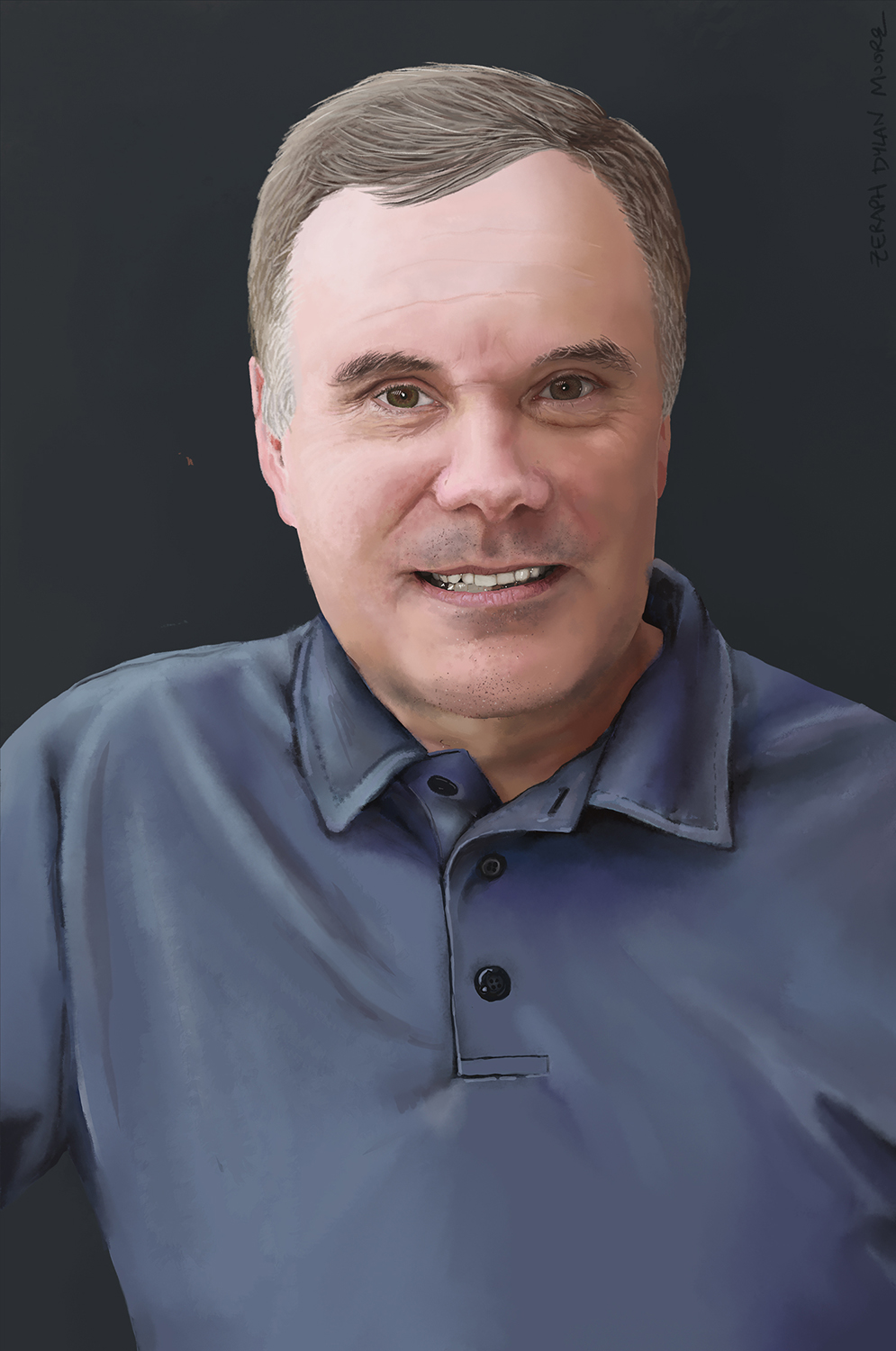Doug
- Penobscot County Jail Storytelling Project (V)
11” x 17”, digital portrait and text, 2021.
Doug’s Story
Doug grew up in Bangor, Maine and was always interested in government and politics. He knew from an early age it was what he wanted to do.
“I thought it was a way I could help people, and helping other people was what made me tick,” he explains. “And what I didn’t tell my family—two sisters, two loving parents—what I didn’t tell my family was that, from my earliest recollections as a child, I suffered from Obsessive Compulsive Disorder—OCD —and anxiety. Anxiety actually came later in life, but the OCD was there from my earliest moments as a child.”
Even as a child, Doug was aware that there was a stigma around mental illness—that it was something that should not be spoken. “Who wants to tell even your family that you’re the ‘crazy kid’?” he reflected. “So I did not. This was my secret.”
As an adult, Doug found his calling working in public administration, landing a position with Congressman John Baldacci as his communications director in Washington. On Sept. 11, 2001, when the planes crashed into the twin towers and put the country into a collective panic, Doug’s anxiety and OCD also went out of control. He began drinking alcohol to self-medicate and ultimately became dependent on alcohol.
Despite these private struggles, Doug went on to become Maine’s chief deputy secretary of state, then deputy commissioner of a different department. But he also began to be arrested due to issues related to his drinking. Initially, he was amazed that no one found out, and that he was able to continue life almost as normal — until his sixth arrest in 2017.
“I went to jail for 136 days, which will be the title of my book if I ever write one, because those 136 days were the most fascinating days of my life,” said Doug, speaking of the period after his sixth arrest. “I learned so much about so many things that I should have known about during my three decades in government but really never paid attention to: The injustices, the inequities, how we treat the poor and the ill. It’s just so shameful.
“When I knew I was going to be there for more than a night or two [at Penobscot County Jail], I decided, “Okay, I’m going to learn everything I can about this. I’m gonna talk to every employee that I can, every inmate that I can. I’m gonna learn why people are here.” Because it becomes clear to you when you’re in jail that you are not there with the healthy and the wealthy; you are there with the sick and the poor.”
Throughout his time at PCJ, Doug observed the dysfunctional culture that contributes to PCJ’s endemic problems, from hostile guards who had no communication with their own supervisors on problems in the jail, to extreme difficulty accessing any type of medical or mental health care, to blatant retaliation for complaints.
While at PCJ, Doug found he could not get his prescribed mental health medications, which he had begun shortly before entering jail. “Oftentimes, sadly, if you go in there as I did, taking a couple of medicines for a mental health condition, they’re gone! They’re all gone. For ten weeks I tried to connect with the mental health staff at PCJ to get my medicine.”
Retaliation inside of PCJ, Doug explains, is a fact of life. Everyone knows about it. “I had other people who had been in the jail in the past say, ‘You know, you’re going to get in trouble. You’re going to get in trouble for speaking out.’ Well, they were right.
“By February of 2018, I was well known as the troublemaker, because I was asking questions, I was writing other people’s grievance forms. In one block I was in, they called me “the lawyer,” even though I don’t have a law degree.
“So because I was the known troublemaker for asking too many questions, for correcting problems and speaking up for other people… I was sent— twice, I was sent to lockdown.”
“When I got out of jail, I thought, ‘Oh, the sheriff just doesn’t know what’s going on in here. And he’ll be…’ I don’t know why I thought this. I thought, you know, ‘He’ll want to know!’
After his release, Doug founded No Penobscot County Jail Expansion, a community advocacy group fighting for those incarcerated inside Penobscot County Jail. Frequently, Doug can be found writing, educating, challenging and organizing to keep pressure on public officials to do more to keep people with mental illnesses and substance use disorders out of jail. “I paid no attention to these things until they personally impacted me,” Doug says. “And so I’m grateful to anyone who pays attention, because I never did. But I do now!”
Interview/Editing by Zeraph Dylan Moore.
Artist Statement
The Penobscot Jail Storytelling Project is a community-based, multidisciplinary project raising up the voices and priorities of people who have been jailed in Penobscot County, Maine. We are currently a team of 13 interviewers, transcribers, artists, organizers and advisors under the umbrella of community group No Penobscot County Jail Expansion. Learn more here.
Artist Bio
Zeraph Dylan Moore, who founded the project and serves as co-coordinator, interviewer and portrait artist is a queer, disabled trans man living in central Maine. His dream is to see Penobscot County become a nationwide model for transformative healing and justice.


